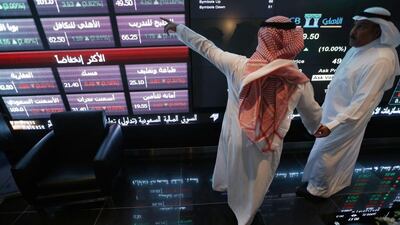There is a good chance that both Saudi Arabia and Kuwait will both be upgraded to emerging market status by the index provider FTSE as early as September because of reforms undertaken in both countries by market regulators, according to the Egyptian investment bank EFG-Hermes.
"We see a strong chance of an upgrade for Kuwait and Saudi Arabia," said Mohamad Al Hajj and Simon Kitchen, analysts at the bank. "We believe Kuwait returns could be stronger as it is the least anticipated of the two, and we are overweight on Kuwait and underweight on Saudi Arabia."
An upgrade by FTSE of Kuwait and Saudi Arabia to emerging market status would attract about $4.5 billion (Dh16.5bn) into both markets, according to EFG. Of that, Saudi Arabia, which is expected to account for 2.5 per cent of FTSE's EM Index, would account for $3.75bn. and Kuwait, which may make up 0.5 per cent of the index, would attract $740m.
Any promotion of Kuwait and Saudi Arabia to emerging market status would not happen immediately but in two phases, which would likely see listed companies from both countries join the index in 2019 at the earliest.
_________________
Read more:
Emerging Market inclusion would be cherry on the cake for Kuwait
Saudi Arabia added to watchlist for emerging market status by MSCI
_________________
Still, the investment bank noted that there were a number of factors that might delay Kuwait and Saudi Arabia's entry into the emerging market universe.
"In Saudi Arabia, the remaining issue is low custodian limits on investor exposure – this could be resolved by setting central clearing," the analysts said.
"In Kuwait, improvements to the current auction (length and structure) and/or ability to cross on-market could be required by index–tracking funds before an upgrade becomes effective."
FTSE has not been the only index provider scrutinizing Saudi Arabia, the biggest economy in the Arab world, for an upgrade. The index compiler MSCI said in June that it had added Saudi Arabia to its watchlist for possible addition to its emerging market measure of stocks after the Kingdom fulfilled a number of pending requirements including bringing settlement in line with leading international stock exchanges.
Regional investors expect that investors who track indexes, typically known as passive investors because they don't pick stocks, will buy between US$10 billion to $12bn of Saudi equities as a result of the upgrade while investors that pick stocks, called active investors, will invest a further $30bn to $35bn.
Saudi Arabia has been closely watched by investors over the past year as the world's biggest producer of oil has pledged a series of reforms to make it less dependent on oil in the aftermath of the crash of hydrocarbon prices in 2014. Among the things it has promised to do, the kingdom is planning to sell shares in Aramco, the biggest producer of oil, to the public.

